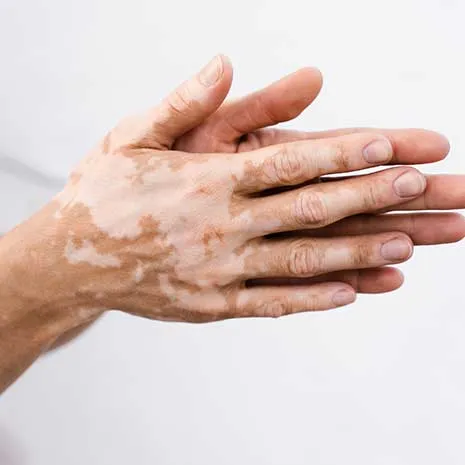Nutritional Guidelines for Vitiligo Patients

Nutritional Guidelines for Vitiligo Patients
- 10 July 2025
- 274

Vitiligo is a chronic, progressive skin condition characterized by the destruction or dysfunction of melanocytes — the cells responsible for producing melanin, the skin’s pigment. Clinically, it presents as well-defined, depigmented white patches and often leads to significant psychological distress, loss of self-esteem, and social withdrawal due to its cosmetic implications.
Although vitiligo is not a nutritional disorder per se, research has increasingly shown that nutrition plays a critical role in modulating the immune system, oxidative stress, and inflammatory responses — all of which are relevant to vitiligo pathogenesis. Therefore, modern vitiligo management benefits from a holistic approach, including pharmacologic treatment, psychological support, and nutritional intervention tailored to immune regulation and skin health.
The Link Between Vitiligo Pathogenesis and Nutrition
Vitiligo is believed to be multifactorial in origin, with several interplaying mechanisms:
- Genetic predisposition (e.g., NLRP1, PTPN22 mutations)
- Autoimmunity (especially T-cell mediated)
- Oxidative stress (increased ROS damaging melanocytes)
- Neurochemical imbalances
- Environmental triggers (e.g., sunburn, chemicals, emotional stress)
Many of these pathways — particularly oxidative stress and immune dysregulation — can be influenced by dietary factors. An antioxidant-rich, anti-inflammatory diet may help prevent melanocyte damage and slow the progression of depigmentation.
Evidence-Based Nutrients Beneficial for Vitiligo Patients
1. Antioxidants and Phytochemicals
Oxidative stress is a well-established contributor to vitiligo. Dietary antioxidants help neutralize reactive oxygen species (ROS) and protect skin cells.
- Vitamin C: Essential for collagen synthesis and cell repair. Found in citrus fruits, strawberries, kiwi, bell peppers
- Vitamin E: Inhibits lipid peroxidation. Found in almonds, olive oil, sunflower seeds
- Polyphenols: Plant compounds with anti-inflammatory and antioxidative properties. Green tea, blueberries, grapes
- Beta-carotene and Lycopene: Pro-vitamin A antioxidants. Carrots, tomatoes, pumpkin
Advanced compounds such as resveratrol, curcumin, quercetin, and EGCG have shown promise in experimental models by protecting melanocytes and modulating immunity.
2. Vitamin D
Vitamin D regulates both the innate and adaptive immune system. Numerous studies have identified low vitamin D levels in vitiligo patients.
- Sources: Fatty fish, egg yolk, fortified dairy, supplements
- Sun exposure: Can aid vitamin D synthesis but must be balanced in vitiligo patients due to UV sensitivity
- Clinical relevance: Topical vitamin D analogs (e.g., calcipotriol) are also used therapeutically in vitiligo
3. Vitamin B12 and Folic Acid
These vitamins play a vital role in DNA synthesis, immune regulation, and neural function. Studies consistently show low B12 and folate in vitiligo patients.
- B12 sources: Liver, eggs, dairy, red meat
- Folate sources: Spinach, lentils, broccoli, legumes
- Evidence: A landmark study by Juhlin & Olsson (1997) demonstrated that B12 + folate + sun exposure led to significant repigmentation
4. Zinc and Copper
These trace minerals are cofactors for tyrosinase, a critical enzyme in melanin synthesis.
- Zinc: Supports immune balance and skin repair
- Copper: Essential for melanin production
- Sources: Seafood, organ meats, whole grains, seeds
- Note: Excessive zinc intake may impair copper absorption — balance is key
5. Glutathione and Sulfur-Rich Foods
Glutathione is the body’s master antioxidant and plays a protective role in cellular health. It can be supported through:
- Sulfur-rich foods: Garlic, onions, broccoli, cabbage, Brussels sprouts
- Precursors: N-acetylcysteine (NAC), selenium, and glycine
- Clinical insight: Reduced glutathione levels have been observed in vitiligo patients, especially in active disease phases
Gut Microbiota, Immunity, and Vitiligo
Emerging research suggests a strong link between gut dysbiosis and autoimmune diseases, including vitiligo. An imbalanced microbiota can increase intestinal permeability (“leaky gut”), resulting in systemic immune activation.
- Probiotics: Yogurt, kefir, fermented vegetables, kombucha
- Prebiotics: Bananas, oats, garlic, asparagus, Jerusalem artichoke
- Scientific data: A study by Zhang et al. (2021) linked microbiota regulation with improved immune modulation in autoimmune disorders
Foods to Avoid or Limit in Vitiligo
Refined Sugar and Simple Carbohydrates
They promote systemic inflammation and glycation, which may worsen immune imbalance.
Excess Gluten (for sensitive individuals)
Although not a universal recommendation, patients with gluten sensitivity or celiac disease may experience improvement with gluten-free diets.
Trans Fats and Hydrogenated Oils
Increase oxidative stress and inflammatory cytokine production.
Excessive Alcohol and Caffeine
Interfere with nutrient absorption and impair gut barrier integrity.
Excess Dairy (in some cases)
May increase systemic inflammation in those with dairy intolerance.
Sample Daily Meal Plan (Antioxidant & Immune-Supportive)
|
Meal |
Suggested Foods |
|
Breakfast |
Spinach-omelet with olive oil, buckwheat toast, mint tea |
|
Snack |
Kefir + walnuts |
|
Lunch |
Grilled salmon, quinoa salad with beetroot and arugula, olive oil & lemon dressing |
|
Snack |
Carrot sticks + hummus |
|
Dinner |
Lentil stew, cauliflower rice, cucumber yogurt dip |
|
Evening |
Turmeric tea + raw honey (1 tsp) |
This plan emphasizes vitamins, minerals, antioxidants, fiber, and anti-inflammatory components in a balanced format.
Frequently Asked Questions
No single food can cure vitiligo. However, a balanced, antioxidant-rich, nutrient-dense diet can support treatment and may help slow disease progression.
No. Nutrition is a supportive tool — not a substitute for medical therapy. It can enhance treatment response and protect melanocytes.
Not always. Supplements should be used based on lab-confirmed deficiencies and under medical supervision to avoid toxicity or nutrient imbalance.
Yes, by improving gut health and modulating immune responses, probiotics can offer indirect benefits in autoimmune conditions like vitiligo.
Some compounds like turmeric (curcumin) and Ginkgo biloba have shown potential in studies. However, they should only be used as complementary therapies with professional guidance.
